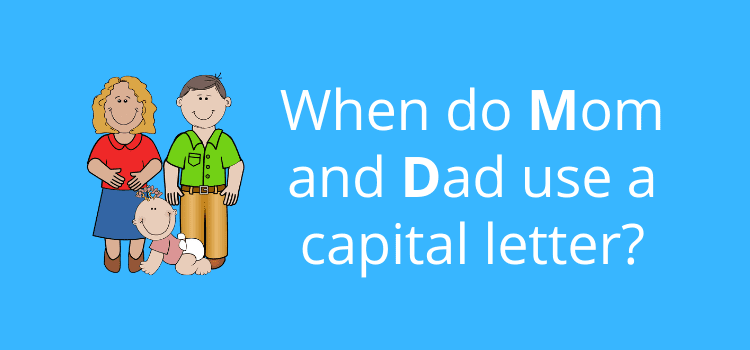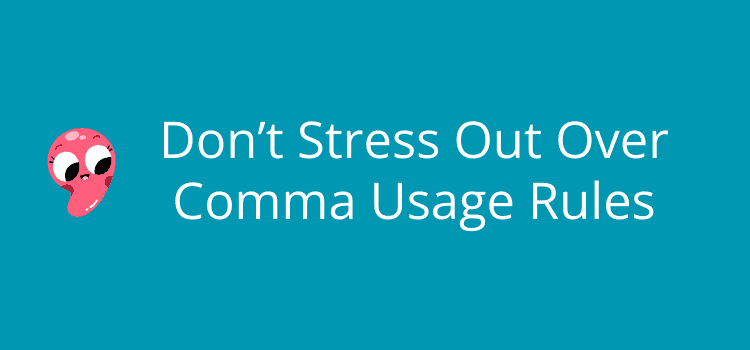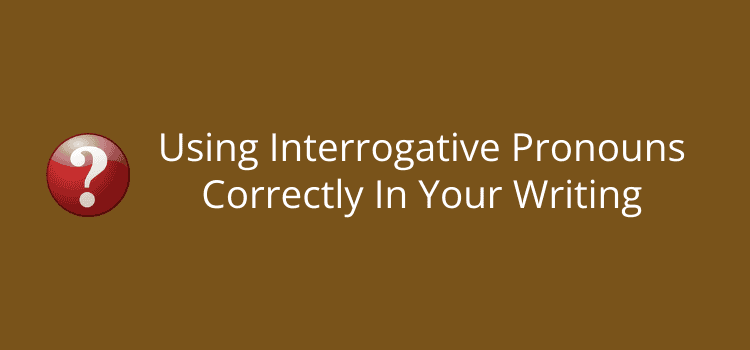
Do you capitalize mom and dad or the names of other family members like granddad or grandma?
Yes, when the word is a proper noun.
No, if it comes after a possessive pronoun such as your, my, his, or her.
No, if the word is after an article, a, an, or the.
When is Mom or Dad a proper noun?
This article’s title could also be Mum and Dad for my British and Australian readers.
Despite the spelling difference, the rules defining when to capitalize the words are the same.
When do you capitalize the words mom and dad, or mum and dad?
The answer is that you need to use a capital letter when the word is a proper noun.
Common nouns never take a capital letter.
But proper nouns, which are names, places, days, and nationalities, always do.
Words such as John, Mary, Thursday, and French all need capital letters.
With family names based on relationships, you need to decide if you use a word as a name or a common noun.
In other words, you need to put on your grammar thinking cap to make the right decision.
Fortunately, there is an easy way to understand how to get it right every time.
When are Mom, Dad, Grandma, or Grandpa names?

When you use any of these words or other family titles, see if you can replace them with a real name. If you can, you capitalize mom, dad, and grandpa.
Hey Mom, can you buy me some chewing gum when you go shopping?
How was your day at work, Dad?
Oh, Grandma called in while you were out.
Grandpa is getting a bit deaf.
In these four sentences, you can replace Mom, Dad, Grandma, and Grandpa with a name. Perhaps Lucy, Steve, Mildred, and Tom.
Hey Mom Lucy, can you buy me some chewing gum when you go shopping?
How was your day at work, Dad Steve?
Oh, Grandma Mildred called in while you were out.
Grandpa Tom is getting a bit deaf.
When are family member titles common nouns?
It is easy to tell when not to use a capital letter. If the word uses a possessive pronoun or an article before it, it is a common noun.
I am sure I saw your dad today at the hardware store.
My mom always calls me on Sunday mornings.
Do you know if your uncle can come to the wedding?
Oh boy, I am really looking forward to being a dad!
So you’re an uncle now. How does it feel?
In the sentences above, it is impossible to replace the titles with a name. They are all common nouns, so they don’t use capital letters.
I am sure I saw your Steve dad today at the hardware store.
My Mildred mom always calls me on Sunday morning.
Do you know if your Joe uncle can come to the wedding?
Oh boy, I am really looking forward to being a Steve dad!
So you’re an Andrew uncle now. How does it feel?
Parts of speech are the secret
If you are new to writing, understanding grammar can be challenging.
When to capitalize family member names is a good example.
However, a good tip is to refresh your knowledge of the basic parts of speech.
When you can quickly identify these, it will help you improve your writing accuracy.
In this case, with words such as mom and dad, understanding the difference in the types of nouns will help you.
But if you are in doubt, use a reliable grammar checker to help you make the best decisions.
Related reading: When Do You Need To Spell Out Numbers In Full In Your Writing?
Share This Article



Hi Derek,
I agree with your approach to using Mum and Dad with possessives but personally I would always write my Mum and my Dad, with capitals. With other possessives, small letters.
Cheers,
Ian Farley
I think it’s always about being consistent, Ian. As with a lot of minor punctuation points, if you chop and change it shows a weakness in your writing, But if you are consistent, and know when and why you choose to use capitals in this case, it shows that you know what you are doing.
Unlike so many things in English, this one I have down. My compliments to you, Derek, as you take out a lot of the mystery to grammar with clear explanations. As a former elementary school teacher for thirty-one years, I appreciate that.
Thank you, Pete. I am pleased to hear that you agree with my keep it simple approach to grammar.